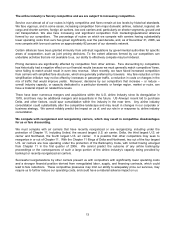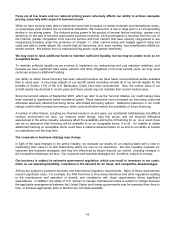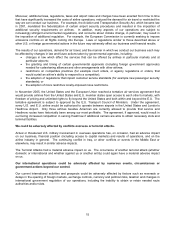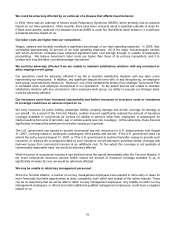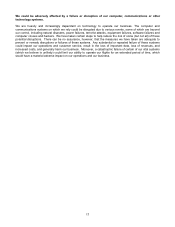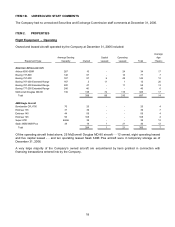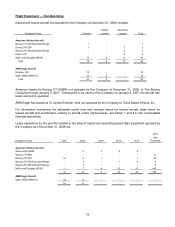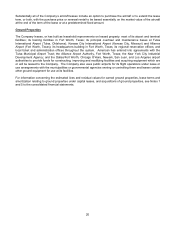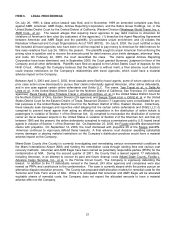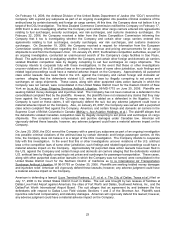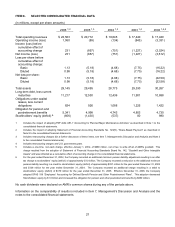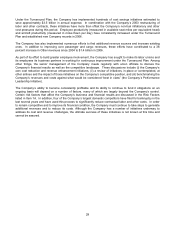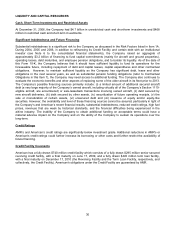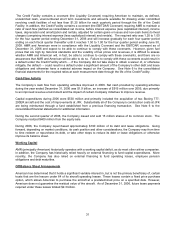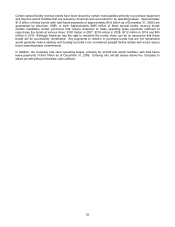American Airlines 2006 Annual Report Download - page 26
Download and view the complete annual report
Please find page 26 of the 2006 American Airlines annual report below. You can navigate through the pages in the report by either clicking on the pages listed below, or by using the keyword search tool below to find specific information within the annual report.
22
American is defending an appeal of a lawsuit, filed as a class action but not certified as such, arising from
allegedly improper failure to refund certain governmental taxes and fees collected by American upon the sale of
nonrefundable tickets when such tickets are not used for travel. In Harrington v. Delta Air Lines, Inc., et al. (filed
November 24, 2004 in the United States District Court for the District of Massachusetts), the plaintiffs sought
unspecified actual damages (trebled), declaratory judgment, injunctive relief, costs, and attorneys' fees. The suit
asserted various causes of action, including breach of contract, conversion, and unjust enrichment against
American and numerous other airline defendants. The defendants filed a motion to dismiss, which was granted.
The plaintiffs appealed to the First Circuit Court of Appeals. On February 7, 2007, the First Circuit affirmed the
dismissal. American is vigorously defending the suit and believes it to be without merit. However, a final adverse
court decision requiring American to refund collected taxes and/or fees could have a material adverse impact on
the Company.
On July 12, 2004, a consolidated class action complaint, that was subsequently amended on November 30, 2004,
was filed against American and the Association of Professional Flight Attendants (APFA), the union which
represents the American’s flight attendants (Ann M. Marcoux, et al., v. American Airlines Inc., et al. in the United
States District Court for the Eastern District of New York). While a class has not yet been certified, the lawsuit
seeks on behalf of all of American’s flight attendants or various subclasses to set aside, and to obtain damages
allegedly resulting from, the April 2003 Collective Bargaining Agreement referred to as the Restructuring
Participation Agreement (RPA). The RPA was one of three labor agreements American successfully reached with
its unions in order to avoid filing for bankruptcy in 2003. In a related case (Sherry Cooper, et al. v. TWA Airlines,
LLC, et al., also in the United States District Court for the Eastern District of New York), the court denied a
preliminary injunction against implementation of the RPA on June 30, 2003. The Marcoux suit alleges various
claims against the APFA and American relating to the RPA and the ratification vote on the RPA by individual
APFA members, including: violation of the Labor Management Reporting and Disclosure Act (LMRDA) and the
APFA’s Constitution and By-laws, violation by the APFA of its duty of fair representation to its members, violation
by American of provisions of the Railway Labor Act (RLA) through improper coercion of flight attendants into
voting or changing their vote for ratification, and violations of the Racketeer Influenced and Corrupt Organizations
Act of 1970 (RICO). On March 28, 2006, the district court dismissed all of various state law claims against
American, all but one of the LMRDA claims against the APFA, and the claimed violations of RICO. This leaves
the claimed violations of the RLA and the duty of fair representation against American and the APFA (as well as
one LMRDA claim and one claim against the APFA of a breach of its constitution). Although the Company
believes the case against it is without merit and both American and the APFA are vigorously defending the
lawsuit, a final adverse court decision invalidating the RPA and awarding substantial money damages would have
a material adverse impact on the Company.



